Regularity results for Legendre-Hadamard elliptic systems
Abstract
I will discuss the regularity of solutions to quasilinear systems satisfying a Legendre-Hadamard ellipticity condition. For such systems it is known that weak solutions may which fail to be C^1 in any neighbourhood, so we cannot expect a general regularity theory. However if we assume an a-priori regularity condition of the solutions we can rule out such counterexamples. Focusing on solutions to Euler-Lagrange systems, I will present an improved regularity results for solutions whose gradient satisfies a suitable BMO / VMO condition. Ideas behind the proof will be presented in the interior case, and global consequences will also be discussed.


